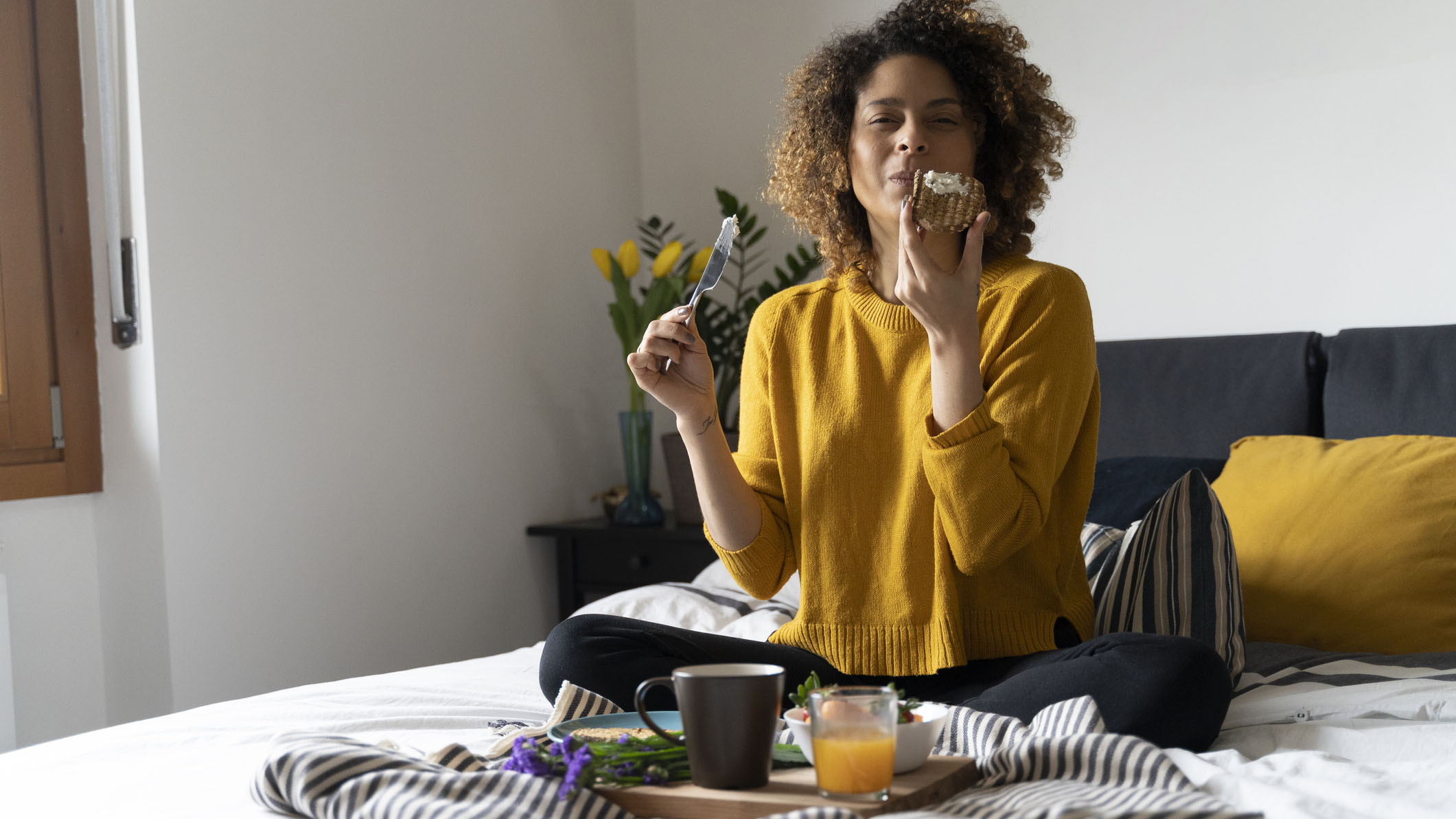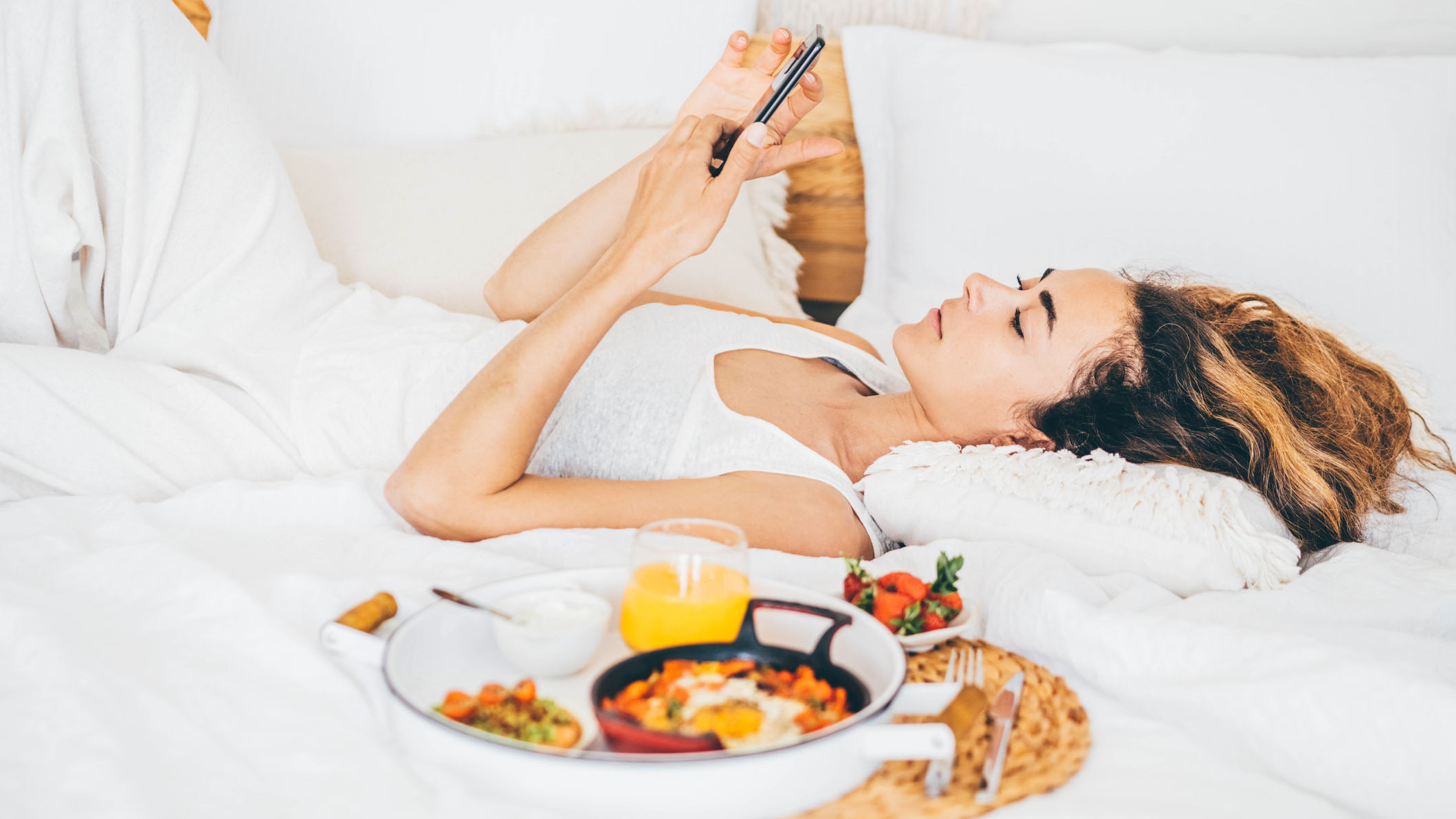Nutritionists reveal the 5 best (and worst) foods for sleep — it’s good news for carb lovers
These are the foods to load up on (and to avoid) to fall asleep faster and for longer at night

Here at Tom’s Guide our expert editors are committed to bringing you the best news, reviews and guides to help you stay informed and ahead of the curve!
You are now subscribed
Your newsletter sign-up was successful
Want to add more newsletters?

Daily (Mon-Sun)
Tom's Guide Daily
Sign up to get the latest updates on all of your favorite content! From cutting-edge tech news and the hottest streaming buzz to unbeatable deals on the best products and in-depth reviews, we’ve got you covered.

Weekly on Thursday
Tom's AI Guide
Be AI savvy with your weekly newsletter summing up all the biggest AI news you need to know. Plus, analysis from our AI editor and tips on how to use the latest AI tools!

Weekly on Friday
Tom's iGuide
Unlock the vast world of Apple news straight to your inbox. With coverage on everything from exciting product launches to essential software updates, this is your go-to source for the latest updates on all the best Apple content.

Weekly on Monday
Tom's Streaming Guide
Our weekly newsletter is expertly crafted to immerse you in the world of streaming. Stay updated on the latest releases and our top recommendations across your favorite streaming platforms.
Join the club
Get full access to premium articles, exclusive features and a growing list of member rewards.
Approximately 1 in 3 adults suffer from insomnia globally, with 35% of Americans experiencing sleep deprivation. Sleep disorders, our bedroom environment and a whole raft of lifestyle factors can wreak havoc on our slumber, but the foods we consume also play a huge role in the quality and quantity of our nightly sleep.
Certain foods contain sleep-inducing properties, while others loaded with sugar and caffeine can quickly derail your sleep. Even some supplements, such as vitamin B, C, D and calcium, can contain sugar and caffeine and so should be avoided before bed.
Alex Ruani, Chief Science Educator at The Health Sciences Academy, and Anna Mapson, Registered Nutritional Therapist from Goodness Me, recently shared with Mattress online the best foods for sleep and the ones to avoid before bed. Here's what the nutrition experts had to say...
- Read more: This hidden Easter egg ingredient could be the reason you're having trouble sleeping this weekend
The five best foods for sleep
1. Carbs
Carbs might have a bad reputation in certain circles, but they can actually help us sleep better. This is because they increase the availability of tryptophan in the brain, an amino acid that produces melatonin — the sleepy hormone. Opt for complex carbs such as brown rice, wholegrains or starchy vegetables, like sweet potatoes, to avoid spiking your blood sugar and making you feel wired.
2. Peppers
While the body produces its own melatonin, a hormone that is crucial to falling asleep, it's interesting to note that certain foods also possess melatonin and its natural sedative properties. Plant-based foods, in particular, are rich sources of melatonin. These include peppers, mushrooms, legumes (beans and lentils), and certain berries.
3. Proteins
B vitamins from proteins play another crucial role in brain function and are involved in the production and use of melatonin and other sleep neurotransmitters. A slight deficiency in any of these B vitamins can lead to disrupted or lower-quality sleep, so it’s important to eat a diet rich in them.
Vitamin B12 is primarily found in animal-based foods such as oysters, fatty fish, poultry, eggs and dairy products. For vegans and vegetarians, focus on incorporating high-quality protein sources in each meal, including options like nuts and lentils.
Get instant access to breaking news, the hottest reviews, great deals and helpful tips.
4. Pumpkin seeds
Don’t throw out your Halloween pumpkins just yet – you might need them to scare off insomnia. This is because seeds, particularly pumpkin seeds, contain magnesium, an essential mineral that not only acts as a muscle relaxant, but also enhances the production of melatonin. This helps send a signal from your brain to your body that it’s time for sleep.
5. Cereals
While magnesium can help with falling asleep, zinc is said to help with the quality of sleep. Both human and animal animal studies have found that eating foods rich in both magnesium and zinc — which include cereals, oats, wheatgerm, sesame seeds, oysters, meat and eggs — has resulted in improved sleep quality. Other great sources of magnesium are sunflower seeds, flaxseeds, almonds and dried thyme.

The five worst foods for sleep
1. Citrus
This one came as a shock to us, too. But although citrus fruits might make for a tasty and healthy snack, Mapson and Ruani reveal that they can disturb your sleep. This is because they are likely to worsen reflux symptoms during sleep, which can disrupt the quality of your slumber, especially if you suffer from conditions such as gastroesophageal reflux. Those with reflux problems should avoid fatty foods, tomatoes, citrus fruit and allium vegetables like garlic and onion.
2. Too much water
Drinking plenty of water throughout the day is vital for a healthy lifestyle, but too much water just before bed can increase the risk of insomnia. This is because instead of falling into a deep sleep, you'll be making multiple trips to the bathroom. So, maintain hydration levels throughout the day instead of pounding the water before bed.
3. Sugar
Several studies have linked increases in sugar consumption to disturbed sleep patterns, more restlessness during sleep, and shorter uninterrupted sleep. Consuming sugary foods like cookies and sweets late at night can disrupt our blood sugar levels, making it difficult to drop off.
4. Caffeine
It's widely known that caffeine is a sleep disruptor and even that midday coffee might interfere with your ability to sleep. Research has shown that consuming 400mg of caffeine six hours before bedtime can postpone sleep by as much as one hour. However, apart from the well-known caffeine sources, such as coffee, tea, cola, and energy drinks, certain foods can be contain hidden caffeine. Dark chocolate, milk chocolate, cookies, and candies can contain significant levels of caffeine, potentially causing delays in falling asleep if consumed before bedtime.
5. Alcohol
Alcohol might make us feel sleepy, but it’s not going to allow for a deep restorative sleep. You may wake in the night, or wake up feeling sluggish in the morning. Increased alcohol consumption can also lead to hangover effects like headaches, digestive discomfort, tiredness and thirst. These effects can significantly affect daily functioning and even disrupt sleep quality the next night.
Expert tips for better sleep
In addition to enjoying foods that promote better sleep, there are other things you can do to ensure you get an optimal amount of shut-eye. Sleep hygiene is a term used to describe the quality of your sleep space and habits, and there are plenty of ways that you can improve your own.
To begin, make your bedroom a calm and clutter free area. Have a good look at your mattress and pillows — do they need replacing? The quality and quantity of your sleep will be impacted by a bed that no longer supports what your body needs.
If you’re looking for a new mattress, our best mattress guide talks you through this year's top options to suit a variety of different budgets and sleep needs. And if you are shopping for a new mattress, you couldn’t have picked a better time as this year's Black Friday mattress deals and sales are in full swing.
Next, establish a consistent sleep schedule, which means waking up and going to sleep at the same time every day (yes, even on weekends). Switching off your phone at bedtime and factoring in time during the day to exercising will also improve the quality of your sleep. Better yet, exercising outdoors will boost your exposure to natural sunlight, which triggers your brain to release the hormones needed for a healthy sleep and wake cycle.

Nicola is the Sleep Editor at Tom’s Guide, where she helps steer the mattress and sleep content published on Tom’s Guide, including our Best Mattress for Back Pain buying guide. With a career in journalism spanning the best part of two decades, Nicola brings experience to the team and the knowledge of what makes a great article, whether that’s a how-to mattress cleaning feature, a deep dive into melatonin gummies, or an in-depth mattress review. As a sleep editor, few better understand how important a decent mattress is to the overall quality of our sleep, and precisely how our sleep impacts our physical and mental health. As well as tackling the vast topic of sleep, Nicola joins the raft of expert mattress specialists at Tom’s Guide, who test and compare a wide range of mattresses in order to guide readers towards the very best options on the market.
 Club Benefits
Club Benefits










